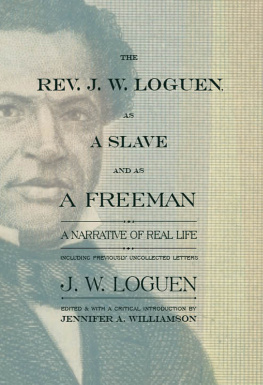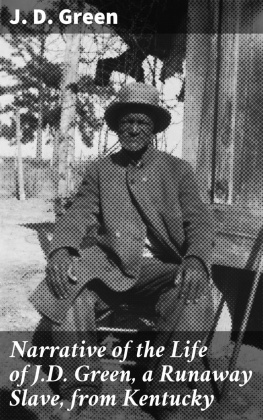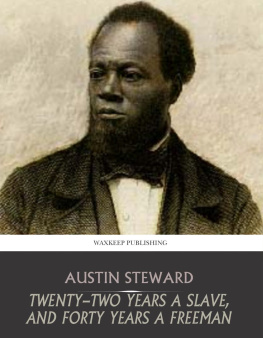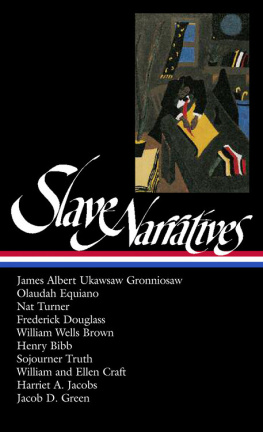

Copyright 2016 by Jennifer A. Williamson
Syracuse University Press
Syracuse, New York 13244-5290
All Rights Reserved
First Edition 2016
16 17 18 19 20 21 6 5 4 3 2 1
 The paper used in this publication meets the minimum requirements of the American National Standard for Information SciencesPermanence of Paper for Printed Library Materials, ANSI Z39.48-1992.
The paper used in this publication meets the minimum requirements of the American National Standard for Information SciencesPermanence of Paper for Printed Library Materials, ANSI Z39.48-1992.
For a listing of books published and distributed by Syracuse University Press, visit www.SyracuseUniversityPress.syr.edu.
ISBN: 978-0-8156-3446-1 (cloth)
978-0-8156-1068-7 (paperback)
978-0-8156-5369-1 (e-book)
Library of Congress Cataloging-in-Publication Data
Names: Loguen, Jermain Wesley, author. | Williamson, Jennifer A., 1978-editor.
Title: The Rev. J. W. Loguen, as a slave and as a freeman : a narrative of real life, including previously uncollected letters / J. W. Loguen ; edited and with a critical introduction by Jennifer A. Williamson.
Other titles: Reverend J. W. Loguen, as a slave and as a freeman
Description: First edition. | Syracuse : Syracuse University Press, 2016. | Includes index.
Identifiers: LCCN 2015045141 (print) | LCCN 2016003289 (ebook) |
ISBN 9780815634461 (cloth : alk. paper) | ISBN 9780815610687 (pbk.) |
ISBN 9780815653691 (e-book)
Subjects: LCSH: Loguen, Jermain Wesley. | African American abolitionists
United StatesBiography | Fugitive slavesUnited StatesBiography |
Antislavery movementsUnited States. | Underground railroad.
Classification: LCC E444 .L83 2016 (print) | LCC E444 (ebook) | DDC 326/.8092dc23
LC record available at http://lccn.loc.gov/2015045141
Manufactured in the United States of America
Table of Contents
Guide
CONTENTS
PREFACE
This edition includes a testimony by E. P. Rogers appended to the second edition of The Rev. J. W. Loguen as well as a poem by E. P. RogersAfrican American poet and minister Elymas Payson Rogers, who also wrote a poem for the 1854 Jerry Rescue Celebrationand two letters appended to the third edition of the narrative, all of which were published sometime after 1859. The first letter was written by Mrs. Sarah Logue, David Logues sister-in-law, in which she admonishes Loguen for running away, chastises him for financial hardships caused by this loss, and criticizes him as unfit for ministry. In response, Loguen blasts Mrs. Logues appeals and refutes her moral points in a powerful indictment of her role as a slave owner.
It should be noted that the original title page remained unchanged in the two subsequent printings, so the second and third edition publication datesduring which the testimony, poem, and letters were appendedare unclear. Publication dates for the second and third editions are still listed as 1859, and Valerie Sallis, of the Syracuse Library Special Collections Research Center, theorizes that because printers J. G. K. Truair & Co. specialized in stereotyping, they may have chosen to reprint the book with additional materials without changing the title plate to save cost and labor or out of confusion over the legal requirements of the copyright statement.
Readers may find a clarification of Loguens name helpful. As later discussed in the introduction, Loguen was originally named Jarm Logue. He later added the n to his last name to differentiate himself from his slave master father, David Logue, and adopted the middle name Wesley to reflect his Wesleyan Methodist sympathies. Loguen spells his first name both Jermain and Jarmain. Because he signed letters and public documents with the initials J. W., it is difficult to determine his preference. Although references to Loguen in the newspaper also usually referred to him by his initials, on the rare occasion his first name was used, it appeared as both Jermain and Jarmain. Unless included in a direct quotation, any mention of his first name will use the spelling Jermain, which is the spelling in the preface and is utilized more frequently than the alternative spellings.
The text of The Rev. J. W. Loguen reproduced here is of the original stereotype edition printed in 1859. I have attempted to reproduce this volume faithfully, and I have preserved certain spelling eccentricities when they do not interfere with comprehension. Nevertheless, some minor corrections were deemed necessary for punctuation, consistency, and typesetting.
Loguens explanatory footnotes have been supplemented by additional editors footnotes for certain names and historical or literary references in the original text and appended letters. A comprehensive annotated version is not the goal of this edition; familiarity with or the ability to identify major abolitionist figures is assumed, and Loguen explains his connection to many individuals in his work. Where references are more obscure or difficult to access for the modern-day reader, additional information has been provided.
ACKNOWLEDGMENTS
This edition of The Rev. J. W. Loguen would not have been possible without the steadfast support and mentorship of an incredible group of scholars.
I am, first and foremost, grateful to Natasha Smith and Mike Millner at Documenting the American South (DocSouth), a digital publishing initiative sponsored by the University Library at the University of North Carolina at Chapel Hill. My personal discovery of Jermain W. Loguen began during my work with them as research assistant and editor for the North American Slave Narratives collection. They enthusiastically supported me, expanding what began as an essay for the DocSouth collection into a critical edition of the original work.
I would like to express sincere thanks to William La Moy, curator of rare books and printed materials at Syracuse University Library, who assisted me in translating the difficult handwriting of nineteenth-century letters. Visits to this archive were supported by summer fellowships from the Northeast Modern Language Association and the Graduate School of the University of North Carolina at Chapel Hill.
I am deeply grateful to Philip F. Gura, who encouraged this project from its inception and who reviewedin the form of a seminar paper for his course on pre-1860 American literaturean early draft of what would eventually become the introduction to The Rev. J. W. Loguen.
I am forever indebted to William L. Andrews, who is an incredible mentor and has taught me so much about literary historical scholarship. Bill was exceedingly generous with his time as well as willing to share a wealth of knowledge and advice on the process of researching the rich history of slave narratives. Bill was an incredible sounding board and editor, and his encouragement to take this research project beyond the classroom and library to publication made the whole venture possible.
Heartfelt thanks go to the following colleagues, for the advice and encouragement they have offered along the way: Linda Wagner-Martin, Wahneema Lubiano, Rebecka Rutledge Fisher, Fred Hobson, Harry Thomas, Angie Calcaterra, Meredith Malburne-Wade, Ashley Reed, Kelly Bezio, and Ben Bolling.
My thanks and appreciation also go to my family and friends, who cheer me on and are always ready to join me on the next literal or literary adventure. Special thanks go to my father, who instilled in me the belief that I can do anything; Im grateful for the ways he makes it possible. To my aunt Martha, who cheers me at every step and constantly inspires me to broaden my thinking. To my late mother, who is always with me.
Next page










 The paper used in this publication meets the minimum requirements of the American National Standard for Information SciencesPermanence of Paper for Printed Library Materials, ANSI Z39.48-1992.
The paper used in this publication meets the minimum requirements of the American National Standard for Information SciencesPermanence of Paper for Printed Library Materials, ANSI Z39.48-1992.